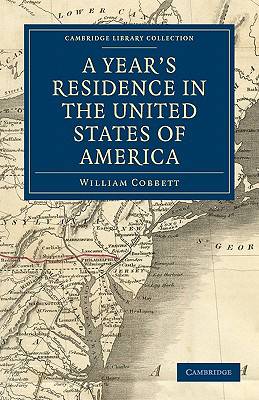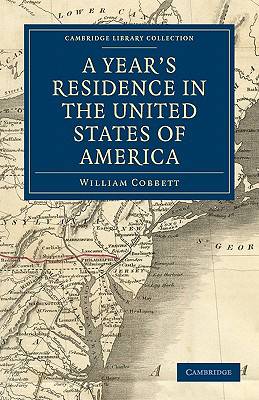
- Afhalen na 1 uur in een winkel met voorraad
- Gratis thuislevering in België vanaf € 30
- Ruim aanbod met 7 miljoen producten
- Afhalen na 1 uur in een winkel met voorraad
- Gratis thuislevering in België vanaf € 30
- Ruim aanbod met 7 miljoen producten
Zoeken
A Year's Residence in the United States of America
Treating of the Face of the Country, the Climate, the Soil... of the Expenses of Housekeeping... of the Manners and Customs of the People; and, of the Institutions of the Country...
William Cobbett
€ 112,95
+ 225 punten
Omschrijving
William Cobbett (1763-1835) was an English farmer and political reformer. He is best known for his Rural Rides (1830), also reissued in this series, which documents the life of nineteenth-century British agricultural workers and calls for social change. In 1816-7 Cobbett campaigned energetically for parliamentary reform, but when new anti-Radical legislation was passed he fled to North America and settled on a Long Island farm. This book, first published in 1818 and reissued here in its second edition (1819), contains Cobbett's account of his year in exile. It describes the climate, soil and crops he observed and the vegetables he grew, as well as the economics of farming in America. Part 2 discusses American customs, laws, and religion. Part 3 contains a description of the mid-West by Thomas Hulme, followed by Cobbett's rebuttal of Hulme's view of the 'Western Countries' as a desirable destination for emigrant British farmers.
Specificaties
Betrokkenen
- Auteur(s):
- Uitgeverij:
Inhoud
- Aantal bladzijden:
- 630
- Taal:
- Engels
- Reeks:
Eigenschappen
- Productcode (EAN):
- 9781108032704
- Verschijningsdatum:
- 22/09/2011
- Uitvoering:
- Paperback
- Formaat:
- Trade paperback (VS)
- Afmetingen:
- 140 mm x 216 mm
- Gewicht:
- 789 g

Alleen bij Standaard Boekhandel
+ 225 punten op je klantenkaart van Standaard Boekhandel
Beoordelingen
We publiceren alleen reviews die voldoen aan de voorwaarden voor reviews. Bekijk onze voorwaarden voor reviews.








